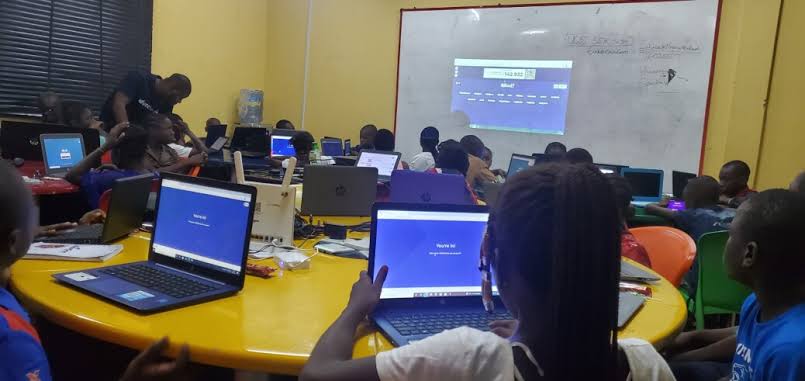In contemporary world digital literacy has become fundamental skill, much like reading and writing. It encompasses the ability to effectively and critically navigate. Evaluate and create information using range of digital technologies.
In Nigeria integrating digital literacy into school curriculum is crucial for several reasons. It prepares students for future workforce. It also bridges digital divide. It enhances educational outcomes and fosters innovation and entrepreneurship.
Preparing Students for the Future Workforce
Digital literacy equips students with necessary skills to thrive in technology-driven world. As industries increasingly rely on digital tools. Platforms the demand for tech-savvy individuals continues to rise. In Nigeria where youth unemployment is a pressing issue, digital literacy can significantly enhance employability. By incorporating digital skills into curriculum schools can ensure that students are not only proficient in traditional academic subjects. But also capable of utilizing digital tools effectively. This dual proficiency can open up numerous job opportunities in fields such as information technology. Digital marketing and e-commerce, among others.
Bridging the Digital Divide
Digital literacy in schools can help bridge the digital divide that exists between urban and rural areas, and between different socio-economic groups. In Nigeria, access to technology and the internet is unevenly distributed, with many students in rural and underserved communities lacking the necessary resources. By integrating digital literacy into the school curriculum and providing the necessary infrastructure, these disparities can be addressed. Ensuring that all students, regardless of their background, have access to digital education can promote inclusivity and equal opportunities.
Enhancing Educational Outcomes
Digital tools can significantly enhance the learning experience by making it more interactive, engaging, and personalized. For instance, educational software and online resources can provide students with additional learning materials, interactive exercises, and real-time feedback. This can cater to different learning styles and paces, thereby improving comprehension and retention. Furthermore, digital literacy enables students to develop critical thinking and problem-solving skills. By navigating digital information, assessing its credibility, and synthesizing data from various sources, students become more discerning and analytical.
Fostering Innovation and Entrepreneurship
Digital literacy fosters innovation and entrepreneurship among students. With the right digital skills, students can turn their ideas into viable projects and businesses. They can learn to create websites, develop apps, and utilize social media for marketing. In a country like Nigeria, where the entrepreneurial spirit is strong, digital literacy can empower the next generation of entrepreneurs to leverage technology for business growth. This can contribute to economic development and job creation, addressing some of the socio-economic challenges the country faces.
Promoting Responsible Digital Citizenship
As students become more active in the digital space, it is crucial for them to understand the ethical and legal implications of their online activities. Digital literacy education can teach students about digital etiquette, privacy, and security. They can learn to protect their personal information, recognize and avoid cyber threats, and understand the consequences of cyberbullying and other harmful online behaviors. By promoting responsible digital behavior, schools can ensure that students use technology in a safe and ethical manner.
Challenges in Integrating Digital Literacy
Despite the clear importance of digital literacy, several challenges hinder its integration into Nigerian schools.
Lack of Infrastructure
One major challenge is the lack of infrastructure. Many schools, especially in rural areas, lack basic amenities such as electricity and internet connectivity, let alone computers and other digital devices. Addressing this requires significant investment from both the government and private sector. Initiatives such as providing solar-powered devices and leveraging mobile technology can help overcome some of these infrastructural barriers.
Shortage of Trained Teachers
Another challenge is the shortage of trained teachers. For digital literacy to be effectively taught, teachers themselves must be proficient in digital skills. This necessitates comprehensive teacher training programs that not only equip educators with the necessary skills but also provide ongoing support and professional development. Partnerships with technology companies and educational institutions can facilitate this training and ensure that teachers are well-prepared to deliver digital literacy education.
Curriculum Development
The curriculum needs to be updated to reflect the importance of digital literacy. This involves not only incorporating digital skills into existing subjects but also offering specialized courses on topics such as coding, digital marketing, and data analysis. Curriculum development should be guided by industry needs and global best practices to ensure that students are learning relevant and up-to-date skills.
Policy and Government Support
The role of policy and government support cannot be overstated in this context. Policymakers need to recognize digital literacy as a priority and allocate sufficient resources towards its promotion. This includes funding for infrastructure, teacher training, and curriculum development. Additionally, policies should promote partnerships between schools, private sector companies, and non-governmental organizations to create a supportive ecosystem for digital literacy education.
Parental and Community Involvement
Parental and community involvement is also crucial. Parents and community leaders need to understand the importance of digital literacy and support its integration into the school curriculum. Awareness campaigns and community engagement initiatives can help build this support and ensure that students have access to digital learning opportunities both at school and at home.
